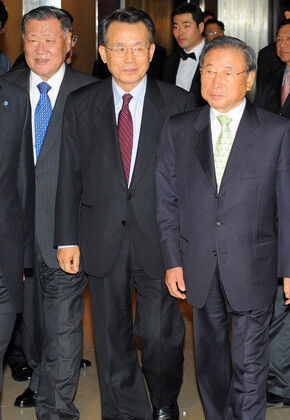hankyoreh
Links to other country sites 다른 나라 사이트 링크
[Analysis] Gov’t evading economic woes by blaming candlelight rallies

While many economists point out that the government’s handling of higher oil prices and present highs in inflation was inappropriate and can mainly be attributed to the difficulties with the domestic economy, the government and business organizations have been trying to link their economic problems to the candlelight demonstrations. As for policy failures, the government seems as though it is trying to shield itself from responsibility by citing “worsening external factors,” seeming to say that the candlelight rallies are responsible for the current economic crisis. Experts say, however, that this kind of “wrongheaded approach” will likely undermine the public’s trust in the government.
The Federation of Korean Industries, in particular, has garnered criticism for having exaggerated the negative effects of the candlelight protests on the economy. This seems to be the worst tactic, according to some experts. A report released on July 8 by the Korea Economic Research Institute, which is affiliated with FKI, claimed, “The recent candlelight protests have cost the country a total of 1.92 trillion won (US$1.85 billion), which includes 1.35 trillion won in macroeconomic costs due to social unrest, 668.5 billion won in direct losses at stores adjacent to the protest sites, 58.5 billion won for costs related to police deployment and 35.6 billion won in productions losses due to labor strikes.”
In the report, titled “The social costs of the candlelight protests,” the institute also argued that the social costs could eventually top 7 trillion won if the candlelight rallies continue. Jo Gyeong-yeop, a senior researcher at KERI, said, “Based on our own macroeconomic model, we have analyzed how 42 illegal protests have caused a ripple effect on the gross domestic product through investment reduction and contraction of consumption.”
In a radio interview broadcast before the report was released, new Deputy Finance Minister Kim Dong-soo also took issue with the candlelight rallies, saying, “The more than two months of candlelight protests are likely to cost the economy and society up to 500 billion won.”
Many economists, however, say that these claims do not make logical sense. Lim Won-hyeok, a researcher at the Korea Development Institute, said, “Though KERI has an independent, macroeconomic model that could be used to calculate the financial damage to nearby stores, it would be difficult to show the comprehensive damage done to society in simple numbers. In order to conduct a proper calculation, the positive effects of allowing the government to rework its policy should also be taken into account.”
Experts say the approach being taken by the government, the ruling party and business organizations is a typical example of tactics used to evade criticism. The head of an investment strategy team at a securities company, who asked not to be named, said, “With uncertainties about the global economy becoming more widespread, money is moving out of emerging markets. If the government continues to promote the idea of an economic crisis with an emphasis on external factors, it could create a much more serious situation, such as the flight of foreign capital, by sending a wrong signal to the markets.”
Please direct questions or comments to [englishhani@hani.co.kr]
Editorial・opinion
![[Editorial] Does Yoon think the Korean public is wrong? [Editorial] Does Yoon think the Korean public is wrong?](https://flexible.img.hani.co.kr/flexible/normal/500/300/imgdb/original/2024/0417/8517133419684774.jpg) [Editorial] Does Yoon think the Korean public is wrong?
[Editorial] Does Yoon think the Korean public is wrong?![[Editorial] As it bolsters its alliance with US, Japan must be accountable for past [Editorial] As it bolsters its alliance with US, Japan must be accountable for past](https://flexible.img.hani.co.kr/flexible/normal/500/300/imgdb/original/2024/0417/6817133413968321.jpg) [Editorial] As it bolsters its alliance with US, Japan must be accountable for past
[Editorial] As it bolsters its alliance with US, Japan must be accountable for past- [Guest essay] Amending the Constitution is Yoon’s key to leaving office in public’s good graces
- [Editorial] 10 years on, lessons of Sewol tragedy must never be forgotten
- [Column] A death blow to Korea’s prosecutor politics
- [Correspondent’s column] The US and the end of Japanese pacifism
- [Guest essay] How Korea turned its trainee doctors into monsters
- [Guest essay] As someone who helped forge Seoul-Moscow ties, their status today troubles me
- [Editorial] Koreans sent a loud and clear message to Yoon
- [Column] In Korea’s midterm elections, it’s time for accountability
Most viewed articles
- 1‘Right direction’: After judgment day from voters, Yoon shrugs off calls for change
- 2[Editorial] Does Yoon think the Korean public is wrong?
- 3Where Sewol sank 10 years ago, a sea of tears as parents mourn lost children
- 4[Editorial] As it bolsters its alliance with US, Japan must be accountable for past
- 5Strong dollar isn’t all that’s pushing won exchange rate into to 1,400 range
- 6[Guest essay] Amending the Constitution is Yoon’s key to leaving office in public’s good graces
- 7Japan officially says compensation of Korean forced laborers isn’t its responsibility
- 8US, Japan and China move to become self-sufficient in semiconductors
- 9In 50 years, half of Koreans are expected to be 65 or older
- 10[News analysis] Watershed augmentation of US-Japan alliance to put Korea’s diplomacy to the test